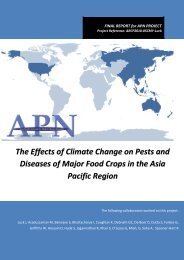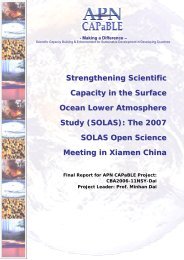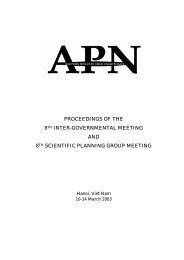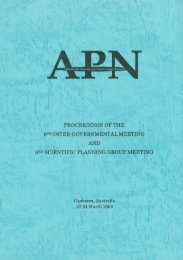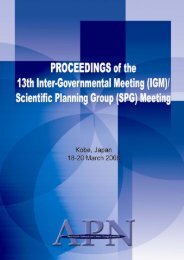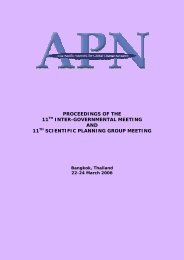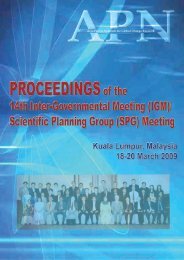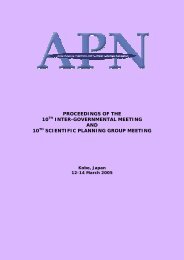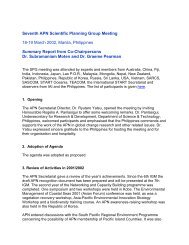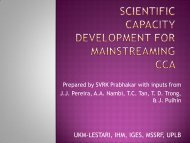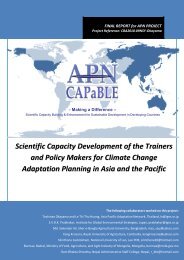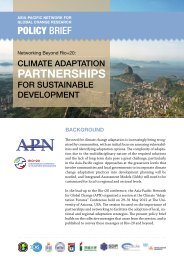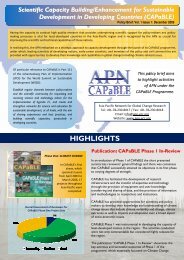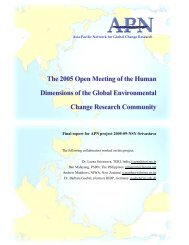APN Newsletter - Asia-Pacific Network for Global Change Research
APN Newsletter - Asia-Pacific Network for Global Change Research
APN Newsletter - Asia-Pacific Network for Global Change Research
Create successful ePaper yourself
Turn your PDF publications into a flip-book with our unique Google optimized e-Paper software.
Recent studies highlighting the impact<br />
of climate change in Cambodia point<br />
to worrisome risks that the country<br />
can no longer af<strong>for</strong>d to ignore. Impacts<br />
of climate change on the country are<br />
clearly seen in the change in natural<br />
rainfall patterns. <strong>Global</strong> warming is likely<br />
to increase the country’s rainfall in wet<br />
seasons and decrease in dry seasons.<br />
This will affect seasonal flooding<br />
patterns that drive inland fish production<br />
and crop irrigation. These concerns<br />
are just a few examples to show Cambodia’s<br />
need to equip itself to deal with the<br />
possible dire consequences of climate<br />
change.<br />
Solutions to climate change <strong>for</strong><br />
Cambodia, as suggested in recent consultant<br />
reports, are to develop appropriate<br />
ways to adapt to climate change,<br />
adjusting natural or human systems in<br />
response to actual or expected climatic<br />
stimuli or their effects to minimize<br />
risks to vulnerabilities and disasters.<br />
However, adapting to these impacts is<br />
an uphill challenge and the government<br />
needs to assess and prioritize vulnerable<br />
sectors, areas and people. Further<br />
work is required to analyse the root of<br />
the problems and find solutions to real<br />
threats from climate change.<br />
I personally believe that there is nothing<br />
more important right now than to align<br />
our thinking and develop some sense<br />
of what is really possible in terms of<br />
change. Systems models are a way to<br />
test our ideas and to sharpen and clarify<br />
our thinking and knowledge. Systems<br />
models will also help us better understand<br />
the systemic causes of climate<br />
change and possible solutions.<br />
Trained in the field of systems engineering<br />
and natural resources science,<br />
I hope to be able to contribute to the<br />
goals of the <strong>APN</strong>. It is my pleasure to join<br />
the <strong>APN</strong> Scientific Planning Group and I<br />
look <strong>for</strong>ward to working with colleagues<br />
in the years to come.<br />
Staff <strong>Change</strong>s in the Secretariat<br />
Yuko Noda<br />
Former Administrative<br />
Assistant<br />
Dr. Veasna Kum<br />
Faculty of Engineering<br />
Zaman University,<br />
Cambodia<br />
SPG Member <strong>for</strong> Cambodia<br />
The Secretariat recently bid farewell to administrative assistant Ms. Yuko Noda,<br />
who worked <strong>for</strong> <strong>APN</strong> <strong>for</strong> over two years and was tremendously dedicated and<br />
supportive. Ms. Noda would like to thank the <strong>APN</strong> <strong>for</strong> providing such a valuable<br />
working environment, which she will miss greatly. “I have too many things to say<br />
to my colleagues at the Secretariat and I will never <strong>for</strong>get the valuable experience<br />
I have gained from such an international workplace,”<br />
said Yuko. “The memories of working at the <strong>APN</strong> will be<br />
jewels in my life. To everyone that I have worked with, thank<br />
you so much <strong>for</strong> your kind support.”<br />
Ms. Chieko Kodama (right) took over as administrative assistant<br />
from April 2012. The secretariat would like to take this<br />
opportunity to warmly welcome her on board.<br />
Staff <strong>Change</strong>s in the Secretariat •<br />
17<br />
News from the Secretariat



